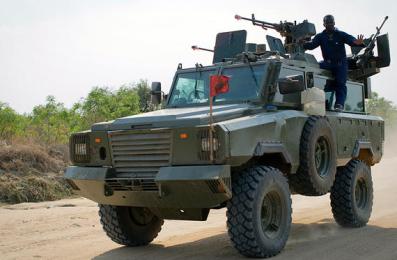Washington demands withdrawal of foreign troops from S. Sudan
February 8, 2014 (WASHINGTON) – The US government has called for the withdrawal of foreign forces that have interfered in the internal conflict between rival factions in South Sudan and urged to desist from violating the recently signed cessation of hostilities agreement in Addis Ababa.

“We urge the redeployment or phased withdrawal of foreign forces invited by either side, and warn of the serious consequences which could result from any regionalization of this conflict,” Psaki said.
She also called for an inclusive reconciliation process in the IGAD-sponsored political dialogue in the Ethiopian capital, Addis Ababa.
The American call for the withdrawal of Ugandan troops comes as Juba and Kampala are finalising a military cooperation agreement between the countries. Uganda says the participation of its troops helped to maintain South Sudan’s stability.
Igad countries also showed frustration saying the Ugandan involvement in the conflict weakens their efforts to end the Conflict. But Juba responded by saying it has the right to demand such support.
The rebel SPLM-In-Opposition warned in a statement issued in Addis Ababa on 8 February that the non withdrawal of Ugandan troops would eventually lead to the failure of the upcoming round of talks scheduled for 10 February.
Further, Machar’s spokesperson James Gatdet Dak in a message extended to Sudan Tribune welcomed the statement coming out from the US government, saying “this was another urgent reminder to put pressure on president Salva Kiir to withdraw such foreign forces from South Sudan and honour the ceasefire agreement”.
Psaki welcomed the arrival in Juba of the first component of the monitoring team, and “strongly “urge the government of South Sudan to facilitate (the team’s) important work”, which will provide both sides with a mechanism to report any breaches of the agreement.”
The spokesperson further said “deeply concerned by reports of violations” by both sides of the Cessation of Hostilities agreement that was signed in Addis Ababa on January 23.
RELEASE REMAINING 4 DETAINEES
The statement urged Salva Kiir’s government to release the remaining four political leaders who are still in detention in Juba.
“We urge the government of South Sudan to support these efforts and to release four political detainees. The expeditious release and transfer of all of the detainees would reduce tension and build confidence in an inclusive reconciliation process,” it says.
The detained political leader are: former SPLM secretary general, Pagan Amum Okiech, former minister for national security, Oyai Deng Ajak, former deputy minister of defence, Majak D’Agoot and former South Sudanese ambassador to US, Ezekiel Lol Gatkuoth.
COOPERATE FULLY WITH UNMISS
State Department spokesperson also publically requested the government of South Sudan to fully cooperate with the mission of the United Nations Mission in South Sudan (UNMISS) and ensure that it carries out its mandate without any hindrance.
“We also call on the government of South Sudan to fully cooperate with the (…) (UNMISS). It is imperative that the government ensure that any assaults on and threats against UNMISS facilities and personnel immediately cease.
“The mission’s ability to carry out its mandate is critical to establish peace and meet the urgent humanitarian needs of the people of South Sudan,” she further stressed.
UNMISS had earlier complained that senior government officials and troops sometimes tried to force their way into the UNMISS compounds, particularly in Bor town.
The mission was accused of harbouring rebels in its bases. It was also accused of allowing the rebels of using its vehicles and facilities in the country.
However during a visit to South Sudan on 3 February, the head of the UN peacekeeping operations Hervé Ladsous stressed during a visit to UNMISS base in Tomping that he saw thousands of people alive was a clear indicator that UNMISS had made the right decision in opening its gates to civilians.
The violence erupted on 15 December when units of the presidential guards clashed in the South Sudanese capital, Juba, and quickly spread to the other parts of the country.
The two parties are due to start discussing the root causes of the conflict with the aim to resolve it when the peace talks resume in Addis Ababa scheduled for Monday, 10 February.
(ST)
